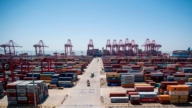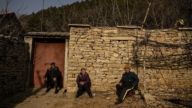【新唐人2014年02月18日讯】中国的银行在新年出现惊人的数据,面对政府遏制信贷增长的努力,1月份新增借贷达到四年来最高。经济学家评论说,这个数据凸显了金融系统违约和坏账的风险。
1月份新增人民币贷款达到1万3200亿元,将近12月份总数的三倍,比市场预期高出2000亿元,是自从2010年一月份以来的最高月度总额。社会融资总量达到2万5800亿元,比外界预测高出25%。
借贷热潮增添了中国越来越依赖债务的担忧,尽管政府此前声称,正努力戒除银行和企业这种依赖性。
英国《金融时报》日前引述“瑞士联合银行”经济学家汪涛的话说,“我们可以看到(中共)当局从未像某些人担忧的那样意图收紧。”而美国美林银行分析师陆挺在报告中说,“现在你知道中国的银行并没有真正收紧”。
中共央行1月份警告﹕银行信贷在快速增长,并呼吁借贷机构控制贷款飙升。央行在11月声明,中国经济可能面临长期去杠杆化。但是贷款的飙升跟央行的警告背道而驰。北京“天则经济研究所”副所长冯兴元对此表示费解。
而“瑞银”分析这种矛盾现象的原因,部分是因为决策层仍然希望保持稳健的投资和GDP增速、以及只愿意容忍信贷增速小幅放缓,因此央行在一定程度上放松了对1月份信贷的控制。回头来看,中国人民银行在春节前收紧银行间市场流动性,或许就是为了防止银行贷款过快增长甚至失控,而不是像市场当时所担忧的那样要显着收紧流动性。
冯兴元怀疑,一月份飙升的信贷不是流入实体经济,而是在空转,因为当前经济下滑,冬季又是投资淡季。
北京天则经济研究所副所长冯兴元:“贷款多就是看他用在哪。如果是用在还欠的民间债务或者企业之间的还债,那就是没有投入到投资环节。实际上你说贷款大量用于买房子好像也不是这回事。然后说经济回转也不是。所以很奇怪。有可能有一大笔钱在空转。就是我刚才讲的。国有企业它容易贷到钱,然后通过委托贷款贷给民营企业或地方政府。”
冯兴元的分析跟一月份数据不谋而合。数据显示,影子银行中,仅委托贷款一枝独秀,大增3965亿元,同比多增1904亿元。
“瑞银”的报告也分析说,并非所有新增社会融资规模都直接投向实体经济,其中一部分,仅仅反映了某些企业和非银行金融机构,在金融中介过程中,所从事的额外链条和环节。
资金空转的一个佐证是,信贷增长的经济回报在快速递减。根据美国《彭博社》的数据,在去年第一季度,每一美元的信贷增长,可以增加GDP17美分,而在2012年,可以增加29美分,在2007年,可以增加83美分。
冯兴元分析说,大量资金空转的后果就是延缓了债务问题爆发的时间,加剧金融风险和债务水平。
冯兴元:“另外一个就是银行的资产质量会下降。说明如果你贷出去是让他还旧钱的话,用新钱来还旧贷。那实际上这个钱已经是有一定的坏账的可能性。所以等于是银行的不良资产率会提高。就是隐性的不良资产率会提高。”
《金融时报》报导说,更密切的观察1月份信贷数字可以发现,影子银行借贷在减少,而银行的表内借贷在增加。信托公司的借贷下降到1040亿元,只有一年前的一半。信托公司是中国最重要的非银行金融机构,也是最近一系列违约恐慌的中心。
分析师说,这种改变如果持续的话,代表北京在试图控制膨胀的影子金融行业,不给经济带来过大的伤害。
“瑞银”分析报告说,展望整个2014年,他们并不十分担心由政策收紧或利率上行导致的信贷增速下滑。相比之下,他们更担心由流动性间歇性收紧、影子信贷监管趋严,或更重要的,潜在的影子信贷违约事件造成局部信贷收缩所引发的信贷波动。
采访编辑/秦雪 后制/陈建铭
China Credit Explosion, Experts Warn of Idle Funds
Alarming data appeared in China’s banks during the Chinese
New Year, since the government effort to curb credit growth.
New lending in January reached the highest in four years.
Economists commented that this data highlights the
risk of default and bad debts of the financial system.
Upon learning that the Governor of Calif. was coming to visit,
In January RMB loans reached 1.32 trillion yuan, nearly three
times the total in December.
This is 200 billion yuan higher than the market expected, and
the highest monthly total since January 2010.
Total social financing reached 2.58 trillion yuan and
25% higher than the outside forecasts.
The lending boom adds worries that China is increasingly
dependent on debt, although the government had claimed that
banks and corporations are trying to get rid of this dependence.
The UK Financial Times recently quoted UBS economist
Wang Tao saying: “We can see the Chinese Communist Party
(CCP) have never intended to tighten like someone worried. ”
While Bank of America Merrill Lynch analyst Lu Ting said
in a report that, “Now you know China’s banks are not really
tightening. ”
The CCP Central Bank warned in January that bank credit is
increasing rapidly, and called for control of the loans.
In November the central bank in November announced that
the Chinese economy could face a long-term deleveraging.
But the surge in loans is against loans from the central bank.
Beijing “Heaven Institute of Economics”deputy director
Feng Yuyuan felt this was inexplicable.
UBS analyzed the reasons behind this paradox, which is
partly due to decision-makers still hoping to maintain a strong
investment and GDP growth.
They are only willing to tolerate a slight slowdown in credit
growth, so the central bank relaxed January’s credit control.
In retrospect, the People’s Bank of China tightened liquidity
in the interbank market before the Chinese New Year,.
Perhaps to prevent excessive growth of bank loans and even
lose control, rather than obviously tightening the liquidity
like the market fears.
Feng Xingyuan suspects that, January’s soaring credit is not
flowing into the real economy.
It is idle, because of the current economic downturn, and the
winter season is the investment off-season.
Beijing Tianze Institute of Economics Deputy Director Feng
Xingyuan: “It depends on where the loans are used.
If is used to repay the private or corporate debts, this is not
to put into the investment part.
Actually it is not correct to say that the loans are used to buy
houses, or that the economy is turning. So it is strange.
There might be a lot of money idle.
It is like I said, the state-owned enterprises can borrow
money more easily, and then through entrusted loans
lend to private enterprises or local governments.’
Feng Xingyuan’s analysis coincides with the January data.
The data shows that among the shadow banks, only entrusted
loans are thriving and increased to 396.5 billion yuan.
This is an additional 190.4 billion yuan compared
with the same period previously.
The UBS report also analyzed that, not all newly social
financing investments go directly to the real economy.
One part only reflects some enterprises and
non-bank financial institutions.
In the financial intermediation process, there are additional
chains and links.
One corroboration of idle funds is that the economic return of
credit growth is diminishing rapidly.
According to U.S. Bloomberg data, in the first quarter of last
year, every dollar credit growth increased 17 cents of GDP.
However, in 2012, this increase was 29 cents, and in 2007,
it was 83 cents.
Feng Xingyuan analyzed that, many consequences of idle
funds are to delay the outbreak of debt problems, which will
increase the financial risk and debt levels.
Feng Xingyuan: “In addition, the quality of bank assets will
decline.
If the money you lend is to return the old debts, to use new
money to repay old debts, there is actually the possibility
of bad debts.
The banks’ non-performing assets ratio will increase, as
well as the implicit rate of non-performing debts.’
The Financial Times reports that, closer observation of the
January credit figures reveal that, shadow bank borrowing is
decreasing, but the banks’ sheet lending is increasing.
Trust companies’ lending fell to 104 billion yuan, in half of
last year.
Trust companies are China’s most important non-bank
financial institutions, and the center of the latest series of
default panic.
Analysts said if such a change continues it means Beijing is
trying to control the expanding shadow financial industry,
not to bring too much economic damage.
UBS analyzes that, looking at the whole of 2014, they are not
worried that the government’s tightening or interest rate
increase will lead credit growth decline.
In contrast, they are more worried because of the tightening
of liquidity and tighter regulation of shadow credit.
Or more importantly, potential shadow credit breach of
contract incidents leading to a partial credit crunch which
causes credit fluctuations.
Interview & Edit/Qinxue Post-Production/Chen Jianming




























